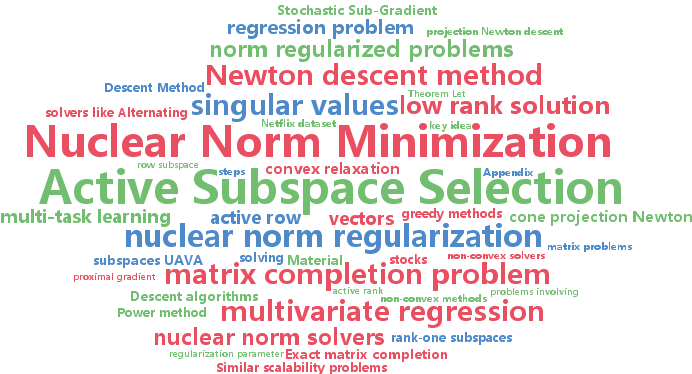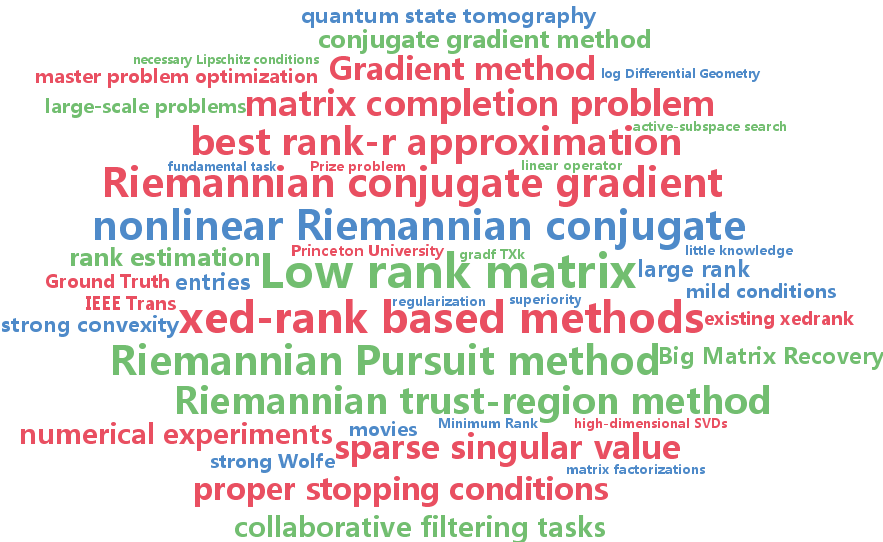matrix completion problem
-
Cho-Jui Hsieh and Peder Olsen
Nuclear Norm Minimization via Active Subspace Selection (pdf)
We describe a novel approach to optimizing matrix problems involving nuclear norm regularization and apply it to the matrix completion problem. We combine methods from non-smooth and smooth optimization. At each step we use the proximal gradient to select an active subspace. We then find a smooth, convex relaxation of the smaller subspace problems and solve these using second order methods. We apply our methods to matrix completion problems including Netflix dataset, and show that they are more than 6 times faster than state-of-the-art nuclear norm solvers. Also, this is the first paper to scale nuclear norm solvers to the Yahoo-Music dataset, and the first time in the literature that the efficiency of nuclear norm solvers can be compared and even compete with non-convex solvers like Alternating Least Squares (ALS).
-
Mingkui Tan and Ivor W. Tsang and Li Wang and Bart Vandereycken and Sinno Jialin Pan
Riemannian Pursuit for Big Matrix Recovery (pdf)
Low rank matrix recovery is a fundamental task in many real-world applications. The performance of existing methods, however, deteriorates significantly when applied to ill-conditioned or large-scale matrices. In this paper, we therefore propose an efficient method, called Riemannian Pursuit (RP), that aims to address these two problems simultaneously. Our method consists of a sequence of fixed-rank optimization problems. Each subproblem, solved by a nonlinear Riemannian conjugate gradient method, aims to correct the solution in the most important subspace of increasing size. Theoretically, RP converges linearly under mild conditions and experimental results show that it substantially outperforms existing methods when applied to large-scale and ill-conditioned matrices.
-
Zheng Wang and Ming-Jun Lai and Zhaosong Lu and Wei Fan and Hasan Davulcu and Jieping Ye
Rank-One Matrix Pursuit for Matrix Completion (pdf)
Low rank matrix completion has been applied successfully in a wide range of machine learning applications, such as collaborative filtering, image inpainting and Microarray data imputation. However, many existing algorithms are not scalable to large-scale problems, as they involve computing singular value decomposition. In this paper, we present an efficient and scalable algorithm for matrix completion. The key idea is to extend the well-known orthogonal matching pursuit from the vector case to the matrix case. In each iteration, we pursue a rank-one matrix basis generated by the top singular vector pair of the current approximation residual and update the weights for all rank-one matrices obtained up to the current iteration. We further propose a novel weight updating rule to reduce the time and storage complexity, making the proposed algorithm scalable to large matrices. We establish the linear convergence of the proposed algorithm. The fast convergence is achieved due to the proposed construction of matrix bases and the estimation of the weights. We empirically evaluate the proposed algorithm on many real-world large scale datasets. Results show that our algorithm is much more efficient than state-of-the-art matrix completion algorithms while achieving similar or better prediction performance.
-
Suriya Gunasekar and Pradeep Ravikumar and Joydeep Ghosh
Exponential Family Matrix Completion under Structural Constraints (pdf)
We consider the matrix completion problem of recovering a structured matrix from noisy and partial measurements. Recent works have proposed tractable estimators with strong statistical guarantees for the case where the underlying matrix is low--rank, and the measurements consist of a subset, either of the exact individual entries, or of the entries perturbed by additive Gaussian noise, which is thus implicitly suited for thin--tailed continuous data. Arguably, common applications of matrix completion require estimators for (a) heterogeneous data--types, such as skewed--continuous, count, binary, etc., (b) for heterogeneous noise models (beyond Gaussian), which capture varied uncertainty in the measurements, and (c) heterogeneous structural constraints beyond low--rank, such as block--sparsity, or a superposition structure of low--rank plus elementwise sparseness, among others. In this paper, we provide a vastly unified framework for generalized matrix completion by considering a matrix completion setting wherein the matrix entries are sampled from any member of the rich family of \textit{exponential family distributions



